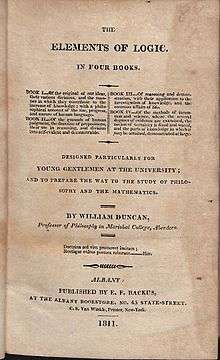Gnosology

In The elements of logic (1811), William Duncan combined a Lockean theory of knowledge with syllogistic logic.[1]
In philosophy, gnosology literally means the study of gnosis, meaning knowledge or esoteric knowledge. Gnosology has also been used to render Johann Gottlieb Fichte's term for his own version of transcendental idealism, Wissenschaftslehre, meaning "Doctrine of Knowledge".[2]
See also
Notes
- ↑ Haakonssen, Knud (2006), "Duncan, William", in Haakonssen, Knud, The Cambridge History of Eighteenth-Century Philosophy, 2, Cambridge University Press, p. 1166
- ↑ Albert Schwegler, Handbook of the history of philosophy, Edmondston & Co., 1879, p. 259.
This article is issued from
Wikipedia.
The text is licensed under Creative Commons - Attribution - Sharealike.
Additional terms may apply for the media files.